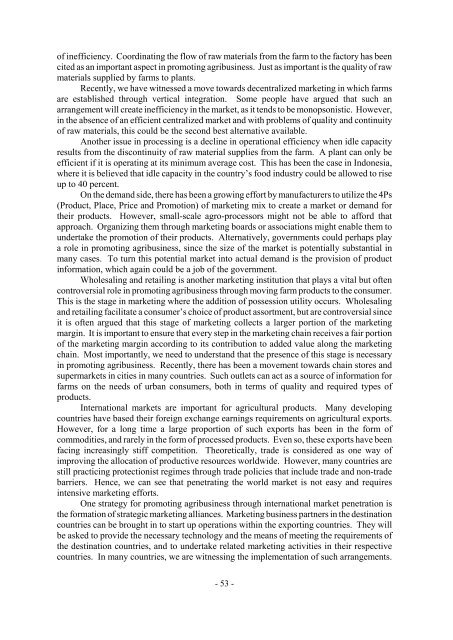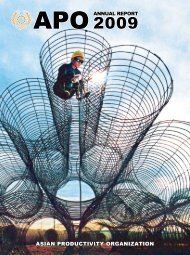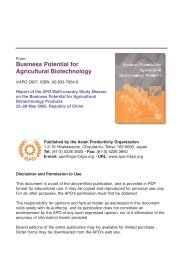Development of Agribusiness Enterprises - Asian Productivity ...
Development of Agribusiness Enterprises - Asian Productivity ...
Development of Agribusiness Enterprises - Asian Productivity ...
You also want an ePaper? Increase the reach of your titles
YUMPU automatically turns print PDFs into web optimized ePapers that Google loves.
<strong>of</strong> inefficiency. Coordinating the flow <strong>of</strong> raw materials from the farm to the factory has been<br />
cited as an important aspect in promoting agribusiness. Just as important is the quality <strong>of</strong> raw<br />
materials supplied by farms to plants.<br />
Recently, we have witnessed a move towards decentralized marketing in which farms<br />
are established through vertical integration. Some people have argued that such an<br />
arrangement will create inefficiency in the market, as it tends to be monopsonistic. However,<br />
in the absence <strong>of</strong> an efficient centralized market and with problems <strong>of</strong> quality and continuity<br />
<strong>of</strong> raw materials, this could be the second best alternative available.<br />
Another issue in processing is a decline in operational efficiency when idle capacity<br />
results from the discontinuity <strong>of</strong> raw material supplies from the farm. A plant can only be<br />
efficient if it is operating at its minimum average cost. This has been the case in Indonesia,<br />
where it is believed that idle capacity in the country’s food industry could be allowed to rise<br />
up to 40 percent.<br />
On the demand side, there has been a growing effort by manufacturers to utilize the 4Ps<br />
(Product, Place, Price and Promotion) <strong>of</strong> marketing mix to create a market or demand for<br />
their products. However, small-scale agro-processors might not be able to afford that<br />
approach. Organizing them through marketing boards or associations might enable them to<br />
undertake the promotion <strong>of</strong> their products. Alternatively, governments could perhaps play<br />
a role in promoting agribusiness, since the size <strong>of</strong> the market is potentially substantial in<br />
many cases. To turn this potential market into actual demand is the provision <strong>of</strong> product<br />
information, which again could be a job <strong>of</strong> the government.<br />
Wholesaling and retailing is another marketing institution that plays a vital but <strong>of</strong>ten<br />
controversial role in promoting agribusiness through moving farm products to the consumer.<br />
This is the stage in marketing where the addition <strong>of</strong> possession utility occurs. Wholesaling<br />
and retailing facilitate a consumer’s choice <strong>of</strong> product assortment, but are controversial since<br />
it is <strong>of</strong>ten argued that this stage <strong>of</strong> marketing collects a larger portion <strong>of</strong> the marketing<br />
margin. It is important to ensure that every step in the marketing chain receives a fair portion<br />
<strong>of</strong> the marketing margin according to its contribution to added value along the marketing<br />
chain. Most importantly, we need to understand that the presence <strong>of</strong> this stage is necessary<br />
in promoting agribusiness. Recently, there has been a movement towards chain stores and<br />
supermarkets in cities in many countries. Such outlets can act as a source <strong>of</strong> information for<br />
farms on the needs <strong>of</strong> urban consumers, both in terms <strong>of</strong> quality and required types <strong>of</strong><br />
products.<br />
International markets are important for agricultural products. Many developing<br />
countries have based their foreign exchange earnings requirements on agricultural exports.<br />
However, for a long time a large proportion <strong>of</strong> such exports has been in the form <strong>of</strong><br />
commodities, and rarely in the form <strong>of</strong> processed products. Even so, these exports have been<br />
facing increasingly stiff competition. Theoretically, trade is considered as one way <strong>of</strong><br />
improving the allocation <strong>of</strong> productive resources worldwide. However, many countries are<br />
still practicing protectionist regimes through trade policies that include trade and non-trade<br />
barriers. Hence, we can see that penetrating the world market is not easy and requires<br />
intensive marketing efforts.<br />
One strategy for promoting agribusiness through international market penetration is<br />
the formation <strong>of</strong> strategic marketing alliances. Marketing business partners in the destination<br />
countries can be brought in to start up operations within the exporting countries. They will<br />
be asked to provide the necessary technology and the means <strong>of</strong> meeting the requirements <strong>of</strong><br />
the destination countries, and to undertake related marketing activities in their respective<br />
countries. In many countries, we are witnessing the implementation <strong>of</strong> such arrangements.<br />
- 53 -
















